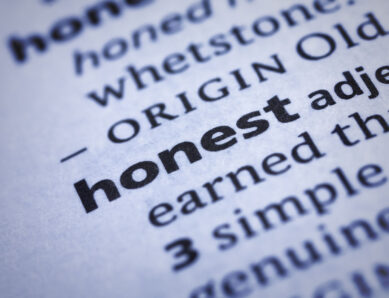Is honesty always the best policy at work? And what does honesty really mean in the workplace?
Does honesty mean that you always do the best job that you can for your employer? Does it mean speaking out when you suspect wrongdoing, or to prevent a calamitous mistake? Or does it just mean replacing the photocopy paper that you “borrowed” when your home printer ran out?
For me, honesty means ’fessing up when I’ve made a mistake, not sugarcoating difficult conversations, and being true to myself even when the consequences can be professionally or personally… disadvantageous.
We wanted to hear about your experiences, and your tips and advice about being honest at work, so we asked our friends and followers on social media: How honest should you be at work?
We were keen to know if you “tell it how it is,” or if you think some things are better left unsaid. And you didn’t disappoint!
Interestingly, our responses showed that both being honest and keeping quiet can end badly!
Facebook friend Phumi Yamela Zuma, from South Africa, didn’t expand on her example, but said, “I usually keep quiet and let things slide but it backfired badly. So telling it like it is as soon as you can is best.”
Also on Facebook, Nick Babcock said, “I tell it how it is, and then get in trouble – sooner or later!”
Honesty Depends on Culture
Several correspondents began their replies with, “It depends on the culture.”
Twitter follower @oviepaulej, from Lagos, Nigeria, added, “Honesty can be likened to incompetence. In the negative scenario, the management believes that any truth outside their desired result is just a made-up excuse. The people who tell the truth in those environments get punished.”
@chasedbtl said, “I’ve had both: one where they are open to reality, the other didn’t want to hear about it and you come off (to management, that is) as negative. #becareful”
On LinkedIn, careers adviser Marcus Burton said that experience had finally taught him one vital lesson: before you act, sleep on it!
He said, “I find that honesty is usually the best policy. However, it has taken me almost 50 years to learn that sometimes when we SLEEP on it, things often look different the next day. Sometimes things are best left unsaid. #emotionalintelligence”
Honesty and Emotional Intelligence
Talent development manager Ilídia Alexandre de Sousa, from Angola, also highlighted the role of emotional intelligence. She said, “Honesty must always be combined with the ability to know what to say, when to say it, how to say it, and who we will say it to.
“Emotional intelligence plays a great part here, because one must use a language which is adequate to the person being talked to, in an honest way. For example, choose your words carefully when talking to someone who doesn’t accept being corrected.
“Therefore, honesty ‘yes.’ But if the equation involves E.I., raw honesty can often be perceived as negative, if you just throw it at the table without any trimming.”
Here are some more snippets of replies from other respondents:
• Richard Chetory, an information manager from France: “Like in any situation, telling too much or being too honest can lead sometimes to troubles, since not everybody follows the rules.”
• Facebook friend Jen Luwaji: “I speak my mind. Can’t bear not being authentic.”
• Mohamed Elsaghir, an account manager from Saudi Arabia, said, “Honesty is instinctive, it’s not a skill. If you are honest, you will tell everything, regardless of the result.”
• @MarianneD15: “It depends on your motivation, what is your positive intent? Also depends on your delivery, can you deliver it in a respectful way that focusses on identifying a helpful way forward.”
What have been your experiences of being honest at work? Let us know, below.




Comments
Katlla Venkatasivanand says
6 years agoAgree, every bit of dig-in responses...Honestly - Honest is like a needle at both end, sometimes it accepted by grace & at some times it backfires - to me being honest at all times is best policy without anticipation of end results/actions of person who is assessing the situation..
Midgie Thompson says
6 years agoKatlla, thanks for sharing your thoughts and I never thought about it like a needle at both ends, yet so appropriate! You make a very important point here about the person receiving the feedback; they may accept it or reject it. Yet, if our intention is for doing good, then that is all that we could ask for.